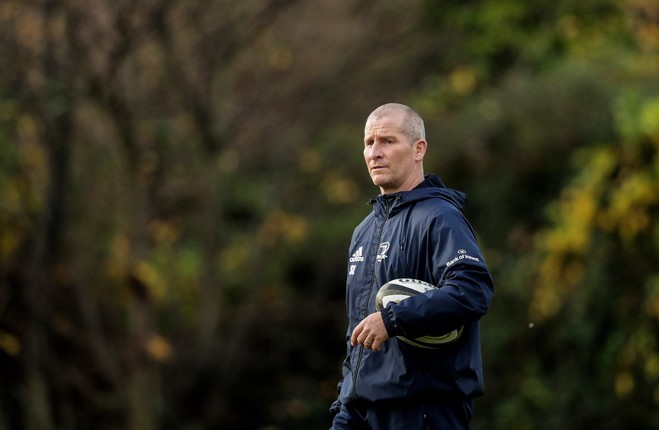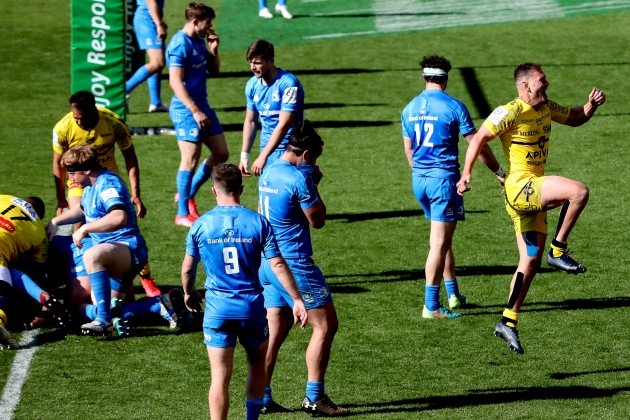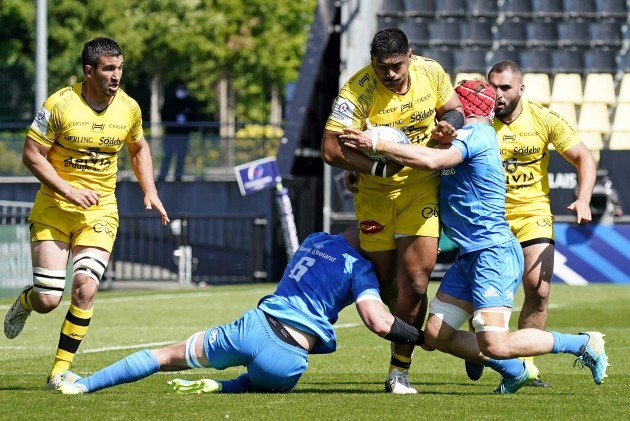AN AUDIENCE WITH Stuart Lancaster always makes for fascinating listening, and the Leinster senior coach is perhaps at his most insightful following a defeat.
On Sunday, Leinster went to France for the latest chapter of their hunt for a record fifth European title. They flew home to Dublin that night reeling from another bruising Champions Cup exit having been physically bettered in the second period by a monstrous La Rochelle pack.
They nursed a similar hangover following last season’s quarter-final loss to Saracens, and the trend started with the 2019 Champions Cup final defeat to the same team in Newcastle.
The short argument is that for all Leinster do right in terms of developing their own talent, they don’t have the physical specimens necessary to mix it with some of European rugby’s elite teams.
It’s an issue Lancaster addressed with the squad during their review of the game on Tuesday.
“I’ll tell you what I talked about in the review this morning, because I thought it was relevant to the group,” Lancaster says.
“I made reference to the book ‘The Dynasty’, which is about the New England Patriots and about the most successful sports team in America, which is what Sports Illustrated said in 2019.
“They won the Super Bowl first in 2002 and then won again in 2004, and I went through each year they played in the Super Bowl and when they went on to win it. They won it six times, so that means in 12 seasons they lost in either a play-off game, a final, a semi-final, a one-point here.
“Even some of the games they won, they won in overtime and there was a great clip of Tom Brady that was on the Tom vs Time documentary series and he summed it up and I showed it to the players as well… It is so hard to win the Champions Cup.
I’m saying to the younger players, ‘Don’t just sit there and think that this is something that’s easy to do.’ You need everything – everything. You need to commit everything to it and everything to go your way, and when you’re playing against the teams that the French teams can pull together with a new TV deal and their pulling power…
“It’s not just the overseas players that I think has improved the French teams, I think there’s the quality of the coaching and credit to Jono (Gibbes) and Rog (Ronan O’Gara) and what they’ve done there. When you play Toulouse, as we’ve played them over the last couple of years, you know how good they are.”
Lancaster is firm in his belief that Leinster have the quality to win another Champions Cup, but doesn’t shy away from the fact the latest French resurgence is changing the landscape in Europe.
“I think they’re fitter, they’re more organised, they’ve got very good young players coming through in the French system and I think the quality of the French home-grown players has definitely improved when you look at the players playing.
“You add in a Kerr-Barlow and a Vito and a Skelton and a couple of South Africans and whatever else, it makes them formidable teams. Can Leinster do it? Can Munster do it? Can an Irish province do it? Absolutely I think we can.
“It’s not going to be easy but I think the model in Ireland is still the right model and the reason we’ve all committed to staying is because we all believe in the quality of the players that we’ve got.
“We’re talking about (small) margins here, some of which are in your control and some of which aren’t and on the day we lost this game. But in my time here, in five years we’ve lost one pool game and we’ve been beaten in a big semi-final, we’ve beaten Exeter away, we’ve beaten Saracens, we’ve beaten the big English teams, we’ve beaten big French teams away and at home.
On this day we didn’t do it but that doesn’t mean when you look at the age profile of the Leinster squad, the players that were missing, the players that I know will benefit from this experience, there’s absolutely no reason why we can’t be at the top table of Europe in my mind – no reason at all.”
Lancaster makes it clear that while he fully supports the Leinster model of leaning heavily on homegrown talent, another foreign import wouldn’t go amiss. Tighthead Michael Alaalatoa recently signed up with the province from the Crusaders, but Leinster are set to lose the considerable experience of Scott Fardy, who will retire at the end of the season.
Lancaster says there could be scope to add more quality to the squad, in the shape of an overseas signing, over the summer.
“I wouldn’t mind one,” he says with a laugh.
“Sometimes rugby is physics, isn’t it? It’s mass times velocity, and it’s helpful to have one or two (players) who can do that.
“That’s up to us to try and create the opportunity, persuade the powers that be to do that. I still believe that a homegrown squad that we’ve got can compete at the top end of Europe, I really do.”
Leinster’s senior coach hopes the introduction of the South African teams to next season’s Pro16 will result in a more competitive league and do a better job of preparing his squad for the business end of European competition, but is wary of the amount of Leinster players who will miss those games through international duty.
And while he accepts that Leinster “ultimately lost too many collisions” in the second period against La Rochelle, he also stressed that it can be too easy to form a narrative around that.
“Just to clarify, we’ve lost elements of games on physicality,” he explains.
“There’s definitely moments in the Saracens game in Newcastle where we felt we were playing effective rugby, the same in the La Rochelle match when you watch the game back. The problem is to a certain extent, and I understand why this happens, your mind is drawn back to the last bit of the game. I understand why people would say that, but it’s not necessarily the case.”
Lancaster was then asked to point out where he feels the squad have improved as a unit since their last Champions Cup win in 2018.
“I think we have got better at having variety in our game. We can still play the game of movement, as I describe it, have that ability to take the ball to the edges and move teams around.
“Our average tries in Europe is around four and a half in the last five years. I don’t think you can do that without having that ability to score and play against big teams and create opportunities.
The bits we need to improve on is just the game management pieces, sometimes the exits, our balance between the running game and kicking game, and when we have got those power moments ourselves we need to make those count. Our pick and go opportunities, our driving maul, our scrum, and I don’t think we are million miles away from any of those things.
“Defensively, when you are playing against the power runners, can we be more effective on the double tackles and double up on a Skelton or a Vunipola? They are the things we talk about all the time.
“And the break down obviously is the key. The way the breakdown is refereed is critical to the game we want to play, we want to play where we are on the front, getting quick ball, attacking with good running lines against disconnected defences.
“And at the highest level – and this is probably the thing to finish on – at the highest level the difference I think between say top end (players) and the very best, is that the athletes that you are playing against, if you get the ball out one second quicker then you can attack a disorganised defence. But that one second slowing of that ball, that’s the difference between attacking a disorganised defence and a brick wall.
“And so the breakdown, and how we present the ball, how we clear the ruck, how we deal with those breakdown threats, ultimately for me is almost the differential in the modern game, and the way sometimes it can be refereed and the way teams can approach it, can load it in favour of the defensive team.
“Which is a worry, really, when you consider that’s not the way the game is intended.”
The42 is on Instagram! Tap the button below on your phone to follow us!



